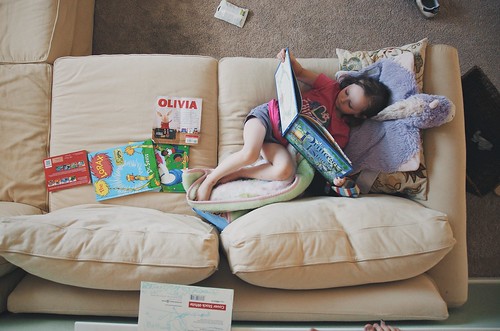In Appreciation: Reading as a Tool Towards Empathy
This is Your Brain on Books

Summer reading is a wonderful chance to engage your children with a love of reading, and recent research suggests that reading fiction is also powerful tool for strengthening our empathy muscles.
Summer is one of my favorite seasons, but not just for beaches and iced coffees, though those are both really good reasons. With summer comes one of my favorite pastimes—summer reading. Okay, to be fair, I love fall, winter, and spring reading too, but now that my oldest daughter is learning to read herself, summer reading has taken on a new meaning as we take part in our local library’s summer reading challenge, with prizes of more books for reading books, which is sort of my idea of the perfect circle.
Watching your child learn to read is a thrill, especially for a bookworm like me. But teaching her to love reading is more to me than about language or even imagination (again, both very good reasons), but also about helping her learn to be a more empathetic person, something I have always instinctively felt fiction delivered on. It turns out that recent research around the relationship between brain activity and reading fiction is also showing the vital role stories can play in growing our emotional and social intelligence, and cultivating empathy in very interesting ways as well.
Several recent studies using brain imaging technology are showing that the brain is doing some heavy lifting while you read fiction, far beyond the basic work of interpreting words. A Carnegie Mellon research study found that reading fiction triggers many diverse brain functions, and even activates the reader’s brain in areas associated with biological visualization. That is to say that the act of reading about Harry Potter playing Quidditch activates the same part of the brain that would be used if we really witnessed said Quidditch match (which would be awesome, BTW.)
The research also showed that reading passages of fictional dialogue and stories with a variety of story characters activates areas of the brain often associated with theory of mind (ToM). Theory of mind is defined as “the ability to attribute mental states — beliefs, intents, desires, pretending, knowledge, etc. — to oneself and others and to understand that others have beliefs, desires, and intentions that are different from one’s own.” These types of perceptions and skills that teach us to put ourselves in another shoes are key ingredients in our ability to be empathetic.
In another study out of Emory University, researchers found that reading about fictional characters in a story elicits the same emotional response in the brain as interacting with real people would. (There’s a reason all my BFFs are from Jane Austen novels. Because in my brain, they are real.) So as the fictional characters live out their lives through the story, and experience difficulties and situations that are complex, multidimensional, and unfamiliar to the reader, the reader’s brain is learning and engaging as if it were really happening around us. There is even evidence that when good things happen in fictional stories, our bodies release oxytocin, the same feel-good chemical found in nursing mothers, couples in love, and other positive social experiences. Our bodies feel the story and react accordingly, both for good and bad, as anyone who has read Where the Red Fern Grows can testify to.
We’ve known for a while that our brains are built to be curious about other people and to try to understand their motivations. Turns out reading fiction may be a way of training our brain to be even better at that. And even though I have no data to back it up, reading is also just plain awesome—but that might just be the oxytocin from my summer reading talking.
[Photo credit: (cc) Bethany Petrik]
ABOUT THE AUTHOR
Amy Diehl
 Amy is a freelance writer and digital communications specialist who has lived in Western Massachusetts for the last ten years. The mother of two young daughters, Amy is a frequenter of coffee shops and bookstores, and an avid hiker. She is a long-time student of mindfulness meditation, and loves nothing more than a good friend, a good book, or a good nap.
Amy is a freelance writer and digital communications specialist who has lived in Western Massachusetts for the last ten years. The mother of two young daughters, Amy is a frequenter of coffee shops and bookstores, and an avid hiker. She is a long-time student of mindfulness meditation, and loves nothing more than a good friend, a good book, or a good nap.
 Hilltown Families
Hilltown Families 





























